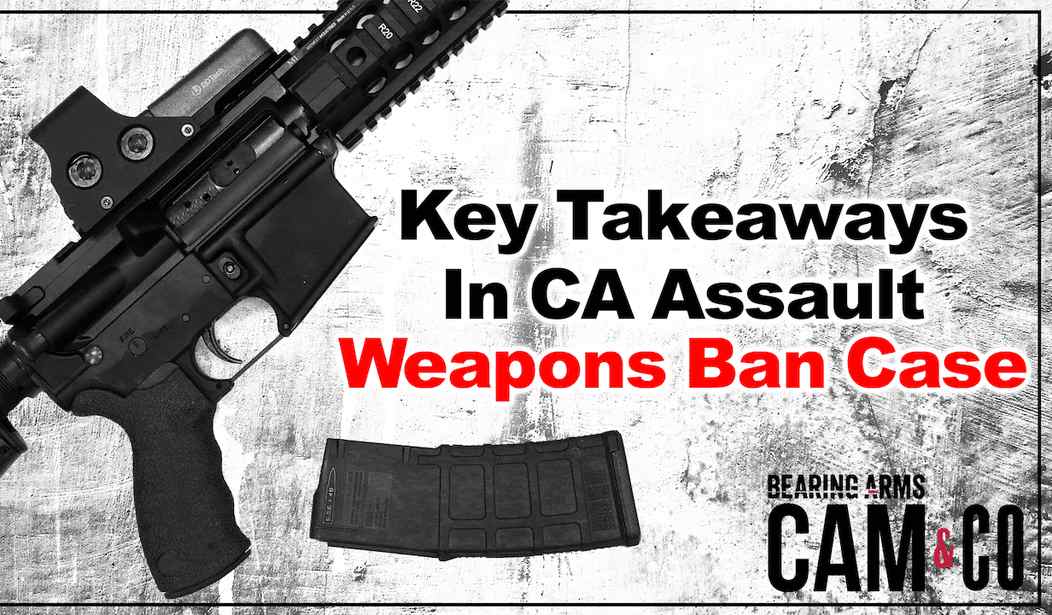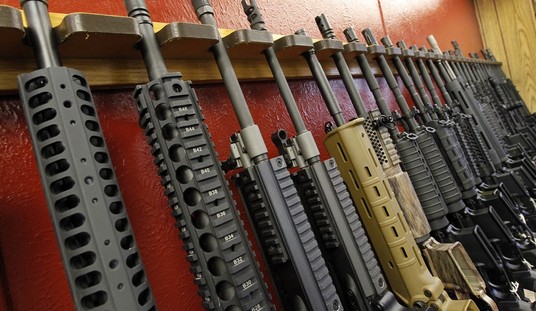Now that a federal judge has declared California’s ban on so-called assault weapons unconstitutional, how long will it take before the case gets to SCOTUS? On today’s Bearing Arms’ Cam & Co we delve into what happens next in Miller v. Bonta, as well as a closer look at the arguments U.S. District Judge Roger Benitez used to shut down California’s claim that their gun ban doesn’t violate anyone’s constitutional rights.
Benitez’s 94-page decision is worth reading in its entirety, but there are a few key takeaways to focus on. First, Benitez cuts through all of the nonsense that other courts and gun control advocates have engaged in to try and claim that the most commonly-sold rifle in today falls outside of the scope of the Second Amendment. The judge uses the “Heller Test” established by the Supreme Court and finds unequivocally that the AR-15 and other modern sporting rifles are indeed protected.
The Heller test is a test that any citizen can understand. Heller asks whether a law bans a firearm that is commonly owned by law-abiding citizens for lawful purposes. It is a hardware test. Heller draws a distinction between firearms commonly owned for lawful purposes and unusual arms adapted to unlawful uses as well as arms solely useful for military purposes. As applied to AWCA, the Heller test asks: is a modern rifle commonly owned by law-abiding citizens for a lawful purpose? For the AR-15 type rifle the answer is “yes.” The overwhelming majority of citizens who own and keep the popular AR-15 rifle and its many variants do so for lawful purposes, including self defense at home.
Under Heller, that is all that is needed. Using the easy to understand Heller test, it is obvious that the California assault weapon ban is unconstitutional. Under the Heller test, judicial review can end right here.
The Heller language is enough to strike down California’s ban on so-called assault weapons, in other words, but Benitez doesn’t stop there. He goes through each and every one of California’s arguments in favor of the ban and makes absolute mincemeat out of each and every one of them.
On the argument that modern sporting rifles aren’t in “common use”:
Nationally, modern rifles are ubiquitous. In 2018 alone (the most recent year with data), 1,954,000 modern rifles were manufactured or imported into the United States. Over the last three decades, 19,797,000 modern rifles have been manufactured or imported into the United States and the numbers have been steadily increasing. Almost one-half of all rifles (48%) produced in 2018 were modern rifles. That is 664,360 rifles. That same year, 34% of buyers purchased a modern rifle for personal protection, while 36% purchased for target practice or informal shooting, and 29% purchased for hunting.
In other words, these are guns in common use for a variety of lawful purposes, including self-defense, target practice/recreation/competition, and hunting. As Benitez points out, modern sporting rifles are even more common than Ford F-150 pickup trucks, and nobody would dispute that those are commonly owned trucks.
Benitez also points out that in the Caetano case a few years ago, SCOTUS ruled that stun guns were protected by the Second Amendment, even though far fewer Americans own them than AR-15s.
The Supreme Court implied that as few as 200,000 stun guns owned nationwide by law abiding citizens is a sufficient number to show common ownership and receive constitutional protection… Based on the evidence presented, it can be confidently said that between at least 200,000 and perhaps 1,000,000 modern rifles are owned in California alone. Based on the lack of evidence at trial that these 200,000 to 1,000,000 California guns are often used in crime, it is reasonable to infer that most are owned by law-abiding citizens who use them only for lawful purposes.
Benitez also takes on the argument that so-called assault weapons are “designed for mass murder”, pointing out that rifles of any kind aren’t used in a lot of violent crimes, and that the percentage of mass shootings in which a rifle was used has remained virtually unchanged since the state of California banned “assault weapons” in the late 1980s. He takes issue with the assertion by the California AG that AR-15s enable “rapid-fire accuracy,” noting that those acting in self-defense need an accurate firearm, while also reminding the defendants that true “rapid fire” shooting involves fully-automatic firearms, not semi-automatic rifles where one pull of the trigger results in one bullet being fired.
There are more goodies from Judge Benitez’s opinion to be found in the video window above, and I’d encourage you to check out today’s show to learn more about the decision to strike down California’s “assault weapons” ban. As to when this case might reach SCOTUS, the Ninth Circuit has been known to take its sweet time in deciding Second Amendment cases, and if Benitez’s decision is upheld by a three judge panel on the Ninth Circuit, the state could delay SCOTUS action by seeking an en banc review of the case. If that happens, it could easily be three years or more before the Supreme Court gets its hands on California gun ban case, though the timeline could be sped up if California actually prevails on appeal, which would allow the plaintiffs to take their case directly to SCOTUS and bypass an en banc review.
Either way, this case isn’t getting to the Supreme Court in the next year, which means that by the time Miller v. Bonta does reach SCOTUS justices will have already weighed in on the upcoming challenge to New York’s carry laws. While that case doesn’t directly implicate California’s ban on modern sporting rifles, it will give the Court the opportunity to address the proper standard of review in Second Amendment cases, which would make it much more difficult for the Ninth Circuit and other appellate courts to ignore the plain language of the Heller decision in upholding gun control laws like California’s so-called assault weapons ban.









Join the conversation as a VIP Member